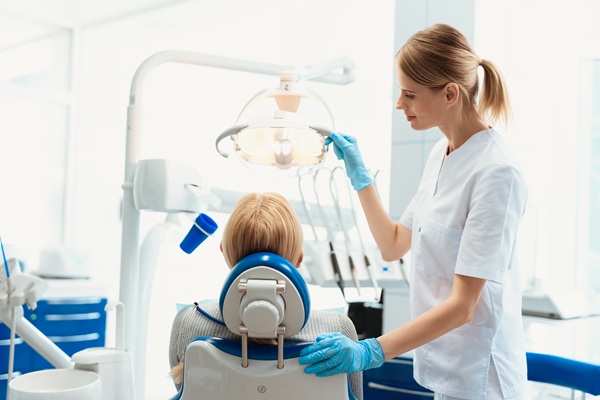Can My General Dentist Help Me With TMJ Pain?

Wanting your general dentist to help you experience less TMJ pain? Some of the more common symptoms associated with temporomandibular joint disorder include a clicking of the jaw, headaches, earaches, pain when opening the mouth wide and overall tenderness in the jaw muscles. If you are experiencing even one of these symptoms, you will also experience some level of pain. This pain can get in the way of your everyday happiness, making it a good idea to ask your general dentist for pain relief help.
About TMJ
Learning more about TMJ will help you better understand this common disorder. Your jaw joints are very complex and can move in different directions. They allow you to perform everyday habits, like chewing food and talking. When a problem occurs that gets in the way of your jaw joints performing their normal functions, problems will soon follow. You may experience a little bit of pain or a lot of pain, it simply depends on your particular situation. If TMJ is not treated in a timely manner, it will only continue to get worse.
Common causes of TMJ
Some of the more common causes of temporomandibular joint disorder include being involved in some type of accident that causes the jaw to be dislocated, clenching the teeth so much that it places a lot of pressure on the jaw, grinding the teeth so often that it gets in the way of proper jaw alignment, having a mouth full of crooked teeth and being diagnosed with arthritis.
Can general dentists treat TMJ?
Yes, a general dentist can treat their patients who have been diagnosed with temporomandibular joint disorder. A general dentist already understands how the jaw functions and can therefore offer patients who are suffering from TMJ pain a few different types of treatment options. Patients who are experiencing severe TMJ pain may need to be referred to an orthodontist for further treatment if general dentistry treatment options do not work. The below list includes three common treatments general dentists will use to treat their TMJ patients who are in pain.
Wear a custom dental appliance
Dental patients whose TMJ diagnosis stems from their clenching or grinding their teeth will often benefit from using a custom dental appliance. Also called a bite guard or a splint, this appliance will keep the patient's upper teeth from coming into contact with their lower teeth.
Hot, cold therapy
Hot and cold therapy requires patients to alternate using hot packs and cold packs to lessen or eliminate their pain. This type of TMJ therapy can be used up to four times a day, which helps to relax the tense muscles that are often the reason behind the pain.
Learning relaxation techniques
There are a number of relaxation techniques those diagnosed with TMJ can utilize to lessen or even eliminate their pain. The techniques specifically target the areas in the jaw muscles that are tense, which can greatly reduce the tension and accordingly lead to less jaw pain.
Are you currently suffering from TMJ pain?
We completely understand how suffering from TMJ pain can get in the way of your being able to properly function during your day. When you are in pain, it is difficult to think about anything else. Understand that there are options available to you so you no longer have to suffer from TMJ-related pain. If you have any questions we can answer for you, please call us now. If you need to make an appointment, we can get you scheduled in at a time that is convenient for you.
Are you considering TMJ treatment in the Georgetown area? Get more information at https://www.healthysmilesgeorgetown.com.
Check out what others are saying about our services on Yelp: Read our Yelp reviews.
Recent Posts
One of the most popular procedures cosmetic dentists offers is teeth whitening. So, if you are one of the many who would like to see your teeth a few shades brighter, you are not alone. However, those considering these procedures should know what to expect. This article covers key details of teeth whitening from a…
Dental restoration can be used to rebuild and restore the function of damaged teeth. They can also be used to restore the aesthetics of damaged teeth. Tooth decay is one of the main reasons teeth become damaged, but other factors like trauma to the face or habits like nail biting or teeth grinding can lead…
During a smile makeover, a cosmetic dentist typically performs two or more procedures as part of an overall plan to improve a smile's appearance. Therefore, the definition of a smile makeover can be very broad and customizable. Smile makeovers can even be as simple as one procedure, such as dental veneers. A smile makeover plan…
Regular visits to the dentist are a must when it comes to maintaining good oral health. But, if you are looking for dental treatment to enhance your smile's appearance, a cosmetic dentist may be the way to go. A cosmetic dentist is a dental professional who specializes in improving the aesthetics of teeth and gums.…


